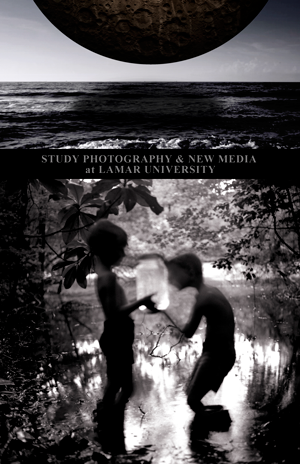Minor in Photography
Program Description
Opting for a Minor in Photography at Lamar University is an excellent choice for individuals who want to explore the captivating world of visual storytelling and artistic expression. Undergraduate students will have a unique opportunity to explore the art, science, and technology of capturing ‘decisive moments’ in an increasingly image-based world. This program seamlessly weaves together technical proficiency and imaginative vision, enabling students to cultivate a profound appreciation for photography as both an art form and a communication tool.
Throughout the course of this minor, students embark on a journey of self-discovery and creative exploration, honing their abilities to capture moments, convey emotions, and communicate ideas through the lens of a camera. A Minor in Photography is a transformative journey that not only equips students with technical prowess but also nurtures creativity, critical thinking, and visual literacy. Whether you're passionate about capturing the beauty of the world or using photography as a medium for social change, this minor offers a pathway to pursue your artistic vision and make a meaningful impact through your images.
The Minor is offered to non-majors for inclusion in degree programs outside of the Department of Art & Design and Art & Design majors as described in the course catalog with the additional coursework beyond degree program requirements, totaling 18 hours of earned credit in Photography with a grade of no less than “C” in all of the courses applied to the Minor.
REQUIRED COURSES (9 hours total):
ARTS 1311 – Design I (No Prerequisite)
ARTS 2356 – Photo I (No Prerequisite)
ARTS 3379 – Photo II (No Prerequisite)
PHOTOGRAPHY COURSE ELECTIVES (9 hours total) - Choose 3:
ARTS 3303 – Large Format Photography
ARTS 3305 – Digital Imaging
ARTS 4303 – Color Photo
ARTS 4305 – Digital Fine Art Photo
ARTS 4306 – Video Art
The following is a brief overview of what you can expect when studying for a Minor in Photography:
- Technical Proficiency: The program begins with a strong foundation in the technical aspects of photography. You will learn about camera operation, exposure settings, lighting techniques, and post-processing software. Understanding these fundamentals is crucial for producing high-quality images.
- Visual Composition: Photography is not just about clicking a button; it's about composing visually appealing and impactful images. Students will delve into the principles of composition, such as framing, balance, rule of thirds, and use of color, to create aesthetically pleasing photographs.
- Storytelling: Photography is a powerful storytelling medium. You'll explore the art of visual narrative, learning how to convey emotions, tell stories, and make statements through your photographs. This skill is valuable not only for artistic pursuits but also for critical thinking skills that are necessary for all professions.
- Critique and Feedback: Constructive criticism is an essential part of any creative field. In photography classes, you'll engage in critiques, where your work will be analyzed, and you'll receive feedback from both peers and instructors. This process helps you refine your skills and develop a critical eye.
- Historical and Contemporary Context: Understanding the history of photography and its evolution over time is crucial for becoming a well-rounded photographer. You'll study the works of iconic photographers and explore the latest trends and innovations in the field.
- Portfolio Development: By the end of the program, you'll have a strong portfolio of your best work. This portfolio can be a valuable asset if you decide to pursue a career in photography or apply for further studies in the field.


